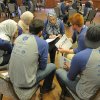Gabriella Pierce, of Tulsa, looked out into a group gathered at Oklahoma City University and immediately felt a kinship. The sense of belonging went beyond the fact that many of the young men and women were college grads like herself.
The young people gathered June 12-14 were all Muslims who had come for an annual event aimed at encouraging young men and women of the Islamic faith to become leaders in their communities. The Muslim Youth Leadership Symposium was hosted by the Oklahoma chapter of the Council on American-Islamic Relations.
“I think it’s important for us to come together,” said Pierce, a University of Tulsa graduate who will start medical school at the University of Oklahoma in the fall. “We face the same sort of challenges every day.”
In a series of team-building exercises, participants homed in on the need for collaboration and oneness in the face of challenges that come with being members of a faith group that is often misunderstood and maligned in America. This anti-Muslim sentiment is often described as “Islamaphobia.”
One exercise required the young people to gather in small groups and clasp hands in such a way that they became tangled. The goal of the exercise was to become untangled without letting go of each others’ hands.
“This signifies that you must stay together no matter what,” Adam Soltani, executive director of CAIR-Oklahoma, told the group. “If you let go of someone’s hand, that signifies that you have dropped responsibility.”
Other activities during the three-day event included workshops, meals and a scavenger hunt at OCU, plus a mock debate at the state Capitol.
Leading by example
Guest speakers included state Rep. George Young, D-Oklahoma City; John Ederer, imam of Islamic Society of Tulsa; and Qasim Mazhar, imam of the Islamic Society of Edmond.
Each speaker encouraged group members to use their particular gifts and talents to make their communities better.
“Every one of you is a shepherd and is responsible for his or her flock. When we’re talking about leadership, every single person is a leader,” Mazhar told the young people.
Young, a Baptist preacher, told the group he was impressed with the accomplishments they had already achieved.
“I hear what you are doing and I see what you are doing and I know the future is bright,” Young said.
He said the young people could best battle the stereotypes and false labels that some non-Muslims attach to them by standing for right and justice.
“Anytime you are doing something beyond what they are expecting you to do, you are making this world the kind of world that you and I want it to be,” Young said.
Shared experience
Like Pierce, Mohammed Shaban, 22, also from Tulsa, said the conference was important because it helped the young people learn from each other ways to inform non-Muslims that all people who ascribe to the Islamic faith are not violent like the Islamic State, also called ISIS.
“Their actions don’t have anything to do with the truth of our religion,” Shaban said.
Pierce said there is often a dissonance between how young American Muslims see themselves and how some others in U.S. society view them.
“To us, we’re just normal Americans going to school, trying to pursue our dreams, but at the same time, there are people who see us as different, and our identity is being challenged,” she said.
“Here, we get to acknowledge this shared experience we all have and find effective ways to kind of ease the tensions because our identity is misconstrued.”


![Mikael Bryant, left, an Oklahoma City University law student and Muslim Youth Leadership Symposium participant, poses for a picture with state Rep. George Young, D-Oklahoma City, after the legislator's presentation at the symposium. [Photo by Carla Hinton, The Oklahoman] Photo - Mikael Bryant, left, an Oklahoma City University law student and Muslim Youth Leadership Symposium participant, poses for a picture with state Rep. George Young, D-Oklahoma City, after the legislator's presentation at the symposium. [Photo by Carla Hinton, The Oklahoman]](http://cairoklahoma.com/wp-content/uploads/2021/05/sq200-7d0c9d494a4fdd8e96716f30b77a031a.jpg)
